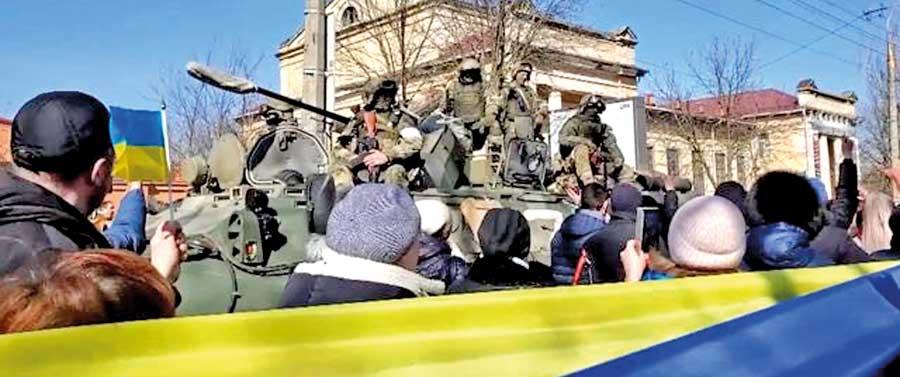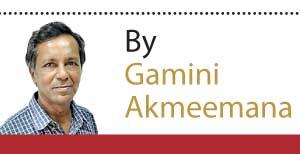A firsthand account of Life in war-torn Ukraine

Pro-Ukrainian protesters pass Russian soldiers during a demonstration in Kherson- Image courtesy - BBC
27 June 2022
I made friends with a Ukrainian called Sergei A. on the internet. After the Russian invasion of Ukraine, he abruptly went silent, and I wondered what happened to him. I finally managed to contact him late in April. He was unhurt but his city in southern Ukraine is under Russian occupation. When I said I would like to write about his experience, he was quite happy. I decided to publish his answers to my questions just as he wrote them (actually written by his son, as Sergei doesn’t know English). Unfortunately, photos of his town, himself or any local inhabitants can’t be used due to security risks. His real name is not Sergei but I have changed it to protect his identity. There wasn’t heavy fighting in his town, but a very disturbing picture of what life is like under Russian military occupation emerges from the following account. 
“Our city, just like the whole country, woke up from the roar of explosions around 5 AM on 24th of February. Fascist Russia began their barbarian war against Ukraine with the bombarding of cities and civilian infrastructure across the whole country – from the north, east, south, from the Crimea peninsula which has been occupied since 2014. In our city, the objects of military infrastructure were bombed. The city has been shaken the whole day from the explosions of Cruise missiles. In the morning on 24th of February there were large queues at the gas stations, drug stores and shops. People tried to stock up the most necessary items. Soon after the occupation troops entered the city. From time to time there was some gunfire at the centre of the city. After that, our life in occupation began.
“Drugs in the city pharmacies ended quite soon and the pharmacies were closed. Connection with the rest of free Ukrainian territory has been almost entirely interrupted. The delivery of humanitarian aid was quite risky, and the trucks were often plundered by the occupation forces. There were hardly any problems with the food, though. Some companies continued working. Apart from that, our region has got developed agriculture, and local peasants bring their products to the city. Many inhabitants, who had the possibility, moved to the free territories. This path was very hard and dangerous. You have to pass through many block posts of the Russian forces and, in some cases, even through the front line. Now this possibility ceased to exist.
"Russians tortured a lot of enterpreneurs, politicians and social activists in my city. The markets are still working though. The banks are still operating, but it’s possible to withdraw cash only at the “black” market for a relatively high percentage"
“From the very beginning the citizens of our city, just like the other occupied cities, showed the occupation forces strong rejection of what has been happening. During the countless days, the Ukrainians by means of the huge demonstrations, bringing the national Ukrainian flags, showed the occupants that there is no way the Russians could break the spirit of the citizens of occupied cities. Russians reacted by arresting the active patriots, journalists, and everybody, who openly showed the denial to collaborate with the enemy. Russians continue to kidnap the locals. They ride by car during the night hours and take from houses the people who are suspected of being patriots, or local entrepreneurs. Some of these locals are back home after a long time. Despite this, the fight against Russians is going on. There are agitation papers with appeals to fight the Russians appearing there. Also, there is information about “casualties” happening with Russian soldiers.
“How does the occupied city look like? Cars are driving, people walk. Sometimes you may forget that the city is occupied. This illusion stops soon, though. Armed with guns, people are standing at most public places. The dormitory areas are being patrolled. The military machines with the big letter “Z” are constantly driving across the city. This letter became a new Svastika, the symbol of Russian fascism, or “Russhism”, just like the German Svastika was the symbol of Nazi Reich. The civilian cars are often stopped and checked. The civilians try not to go by car unless absolutely necessary because of that. Sometimes you can hear gunshots.
“It’s very hard to describe the whole life under the occupation in a short text. Firm confidence in our victory supports us. Confidence, that the Ukrainian army will free all the occupied territories from the Russian fascist occupants. This confidence is backed up by the support – military, material, political and moral, from the whole civilized world. I would like to send my big gratitude to my friend from Sri Lanka, Gamini Akmeemana, who I admire very much, and, on behalf of him, all the people of Sri Lanka. Thank you for helping the Ukrainians, who are now in Sri Lanka and who could not go back home because of war.
“We are pretty sure that the good will win, because next to us there are good willing people standing! Best regards from Ukraine in war to the friends from Sri Lanka!”
"Thank you for helping the Ukrainians, who are now in Sri Lanka and who could not go back home because of war"
Subsequent to this, I sent him a few questions about life under Russian occupation. This is his reply.
(My mail) “Dear Sergei, I read the article and have a few questions for you. Your safety is number one, so keeping that in mind, do you think you can: 1. Send me a photo of yourself and please answer the following questions.”
Hi Gamini,
“Sorry for the late reply, I had some troubles with my internet connection. Hereby are my answers to your questions:”
- It’s too dangerous to take any photos in my city. However, for your article you might choose the photos from the internet for any of the following cities: Kherson, Berdyansk, Melitopol.
- From the previous answer you might guess that I am located in the south of Ukraine.
- The third question was about his occupation. The answer is omitted because that might lead to revealing his true identity.
- When the internet connection is there, I can contact my family and friends without any problem. I usually use messengers (WhatsApp, Facebook Messenger etc), since they are more secure than normal cellular service.
- There are no Russian civilians in my city, as far as I know, only soldiers. I have not talked to soldiers personally, but from what I’ve heard, not all of them are happy with the ongoing war.
- That’s correct, I do have enough food, and starting recently, also sufficient amount of medicine. Russians encourage civilians to go to schools in order to study according to the Russian curriculum, but most of the people refuse to send children to schools. Also, some schools have closed for an indefinite amount of time.
- Leaving the town is quite risky. In case you want to go directly to the free territories, you have to pass numerous checkpoints and there are often delays caused by Russians. Some people spend days in their cars, waiting for a permit to cross the checkpoint.
- I would not call Russians polite, their behaviour varies from neutral to rude in some cases. There were cases when they robbed people, took things like phones, money, clothes etc. I can’t tell about the cases of harassment at the checkpoints, but in other places, there are numerous cases of harrasment and even raping reported, especially in smaller towns. There is no one we could complain about this to, because Russian authorities don’t really care about Ukrainian civilians.

No comments:
Post a Comment
Note: only a member of this blog may post a comment.